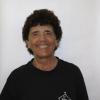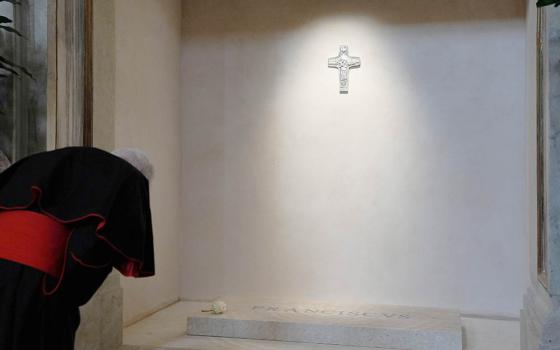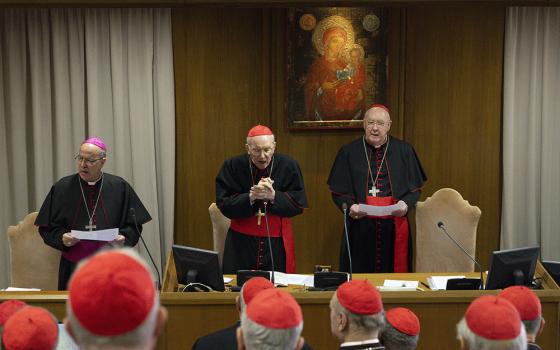
Six eggs and a glass bowl, resting on top of a piece of the religious habit that the author once wore. (Provided photo)
Somewhere in my closet there are pieces of the religious habit I once wore. You are looking at a piece now, although you do not recognize it. All you see are six eggs and a glass bowl. They are resting on a piece of the black habit I wore many years ago. Here the material is self-effacing, if you will, supportive, enhancing the beauty of eggs.
The black material goes wherever my camera goes. One day I slung the camera bag over my shoulder and went over to my mother's house. I thought to photograph the rooms of my childhood, for remembrance. I greeted my mother with a kiss, and then, as usual, I opened her refrigerator to see what she had good.
And there they sat — six white eggs in a glass bowl. That was the end of the childhood rooms. And the beginning of Emily Dickinson. I dwell in possibility she said, baking a black cake in her Amherst kitchen. She cracked 19 eggs against the bowl.
Clearly, I came from more modest means. Six eggs, not even a dozen.
I took my mother's eggs out and carefully laid them on the black habit material which I had arranged in a corner of the dining room floor. Then I placed a standing lamp nearby and asked my mother to tip the shade, directing the light onto the eggs. There, on my knees, with my mother directing the light over my shoulder, I was awestruck over the beauty of eggs, over the beauty of my mother behind me, over the warm nest of her body holding the egg from which I had come.
Advertisement
Bathed in light I caught my breath. Then I remembered Gerard Manley Hopkins, the poet. He also caught his breath the day he saw God as a mother hen brooding over her egg, our world.
And then came another revelation. There on my knees, I saw that each moment is eternal. One by one they are offered to us. Some minutes we take hold of, some not. No matter, they all remain.
Emily Dickinson in her white dress and white apron is eternally cracking 19 eggs in a bowl. One. Then another. And another. You can hear them crack, see them slide down the side of the bowl.
And then, her cake:
"It's all I have to bring today —
This, and my heart beside."
And Gerard Manley Hopkins is forever curled up in his book-lined study, pondering the egg in his hand, thinking all the while of our world, similarly curved. With one hand he holds the egg to the light. With the other he writes:
"The Holy Ghost over the bent
World broods with warm breast and with ah! bright wings."
And the mother forever shines the light on her daughter, bent over the eggs, which forever lie three in a bowl, three in a quiet row. Underneath them, the remnant of a nun's habit.
And the mother forever shines the light on her sons. James and John are called "Sons of Thunder," but it is their mother with the fire. When Christ asks her, "What do you want?" She says, "In your kingdom, put one of my sons on your right and one of my sons on your left."
And where does that leave her? It never enters the mother's mind.
And five houses away from where I live, a motorcade of 50 cars forever streams the three miles from downtown, past our street, to the nearby village of Solvay.
Sometimes the signs decorating the cars say, "Congratulations Graduates of 2020." Sometimes the signs say, "I can't breathe." One car after the other — "I can't breathe." And then George Floyd's heart-rending gasp: "Mama."
And the Holy One forever bends over our world and broods. Bends. Broods. Breathes. And embraces every last one of us with warm breast and bright wings.
That we may take love and fly.
[Joan Sauro, a Sister of St. Joseph of Carondelet, publishes widely in the Catholic press. "We were called Sister" (U.S. Catholic) was awarded first place for Best Essay 2014 by the CPA. ]







